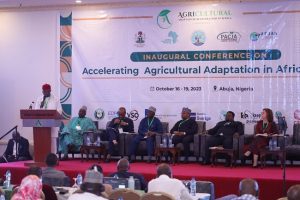Government representatives, policymakers, civil society organisations and other partners from Africa convened in Abuja on Monday, October 16, 2023, for the First Conference on the Acceleration of Agricultural Adaptation in Africa.

The four-day forum organised by the Pan African Climate Justice Alliance (PACJA) and the Government of the Federal Republic of Nigeria together with other partners seeks to galvanise a critical mass of actors towards accelerated agricultural adaptation, including stimulating smallholder farmers’ proactive engagement in international climate dialogue and intervention processes.
During the opening ceremonies, Dr. Sadiq Wanka, the Special Advisor to the Vice presidents of the Federal Republic of Nigeria, thanked the organisers and reminded them that it takes place at the moment Africa’s agriculture is still depending on rain and while farming communities are plunging into further uncertainty as a result of climate-inspired erratic rainfall and shifting seasons. Pastoralist communities, he added, have lost much of their livestock, including camels, cattle, goats and sheep to the raging weather events.
He said: “The inaugural conference on accelerating agriculture adaptation is key to galvanising the critical mass of actors towards accelerated agricultural adaptation, including stimulating smallholder farmers’ proactive engagement in international climate dialogue and intervention processes.”
Dr. Salisu Dahiru, Director-General of the National Council on Climate Change (NCCC), reiterated the importance of the conference as it is expected to be the space for exchange and innovation.
“The importance of this conference cannot be overstated. It stands as a crucial platform where we can unite, share knowledge, and engage in fruitful discussions on strategies and solutions that will pave the way for sustainable agricultural practices in Africa, even in the face of climate adversities. we hope to embark on a journey towards securing the future of food production and ensuring the well-being of our communities,” he said.
Speaking about Accelerating Agricultural Adaptation in Africa, Prof. Anthony Nyong, the Director of Climate Change and Green Growth at the Africa Development Bank (AfDB), said that, to address the social economic and sustainable agenda in agriculture, AfDB set four pillars namely climate smart digital technologies for agriculture and food security; Africa infrastructure resilience accelerator; empowering youth for entrepreneurship and job creation in climate adaptation and resilience; and innovative finance initiatives.
He reiterated: “The African Development Bank recognises that achieving sustainability in our countries hinges upon the development of crucial sectors, with agriculture emerging as one of the most significant avenues for success.”
Mrs. Drita Dade, the Senior Natural Resources Management Specialist who represented the World Bank country office in Nigeria, commended organisers of the conference and asserted that “inaction in addressing climate challenges not only jeopardises food security but also heightens susceptibility to extreme weather events, places rural communities’ livelihoods at risk, and intensifies the strain on already stressed natural resources”.
The AfDB estimates that adaptation and resilience costs for the continent will reach up to $30 billion per annum by 2030. Augustine Njamnshi, chair of Technical and Political Affairs at PACJA, stressed that it’s imperative to think of adaptation but also look beyond the simple concept of adaptation.
“Adaptation in the agriculture sector is an urgent priority for our region. It is a matter of survival, protecting the livelihoods of millions of farmers, ensuring food security for our growing population, and preserving our rich natural resources for generations to come. We must act with a sense of urgency, with a recognition that the time for action is now,” said Njamnshi.
Rep. Sam Onuigbo, a Parliamentarian and sponsor of Nigeria Climate Change Act 2021, said that agriculture is one of the pillars of development.
“The north-east itself is an agrarian area, north-east constitutes one third of the land mass of the entire nation but we also know that even though agriculture is the mainstay of their economy they are threatened by the devastating effects of climate change,” Onuigbo said.
The Parliamentarian said that climate change has caused drought, desertification, drying up of the Lake Chad, forced migration.
“When people lose their livelihoods, they look elsewhere for their survival. Forced migration which now fuels insecurity and insurgence demands an holistic approach.
“The north- east development commission is not just going to do the reconstruction of buildings, they are also going to handle the physical security and the human security which has to do with the well-being of the people,” Onuigbo assured.
Prof. Ibrahim Choji, Board Chairman, Climate and Sustainable Development Network (CSDevnet), said that the conference was looking at the effects of climate change which is increasing daily on agriculture.
“Agriculture we all know is the mainstay of Africans where over 70 per cent depend on. It is a source of livelihood; it is a source of products for industries on which many depend on.
“So, with the increasing threat of climate change to the sector we decided as civil society organisations to come together with stakeholders within Africa to rescue this sector,” Choji said.
